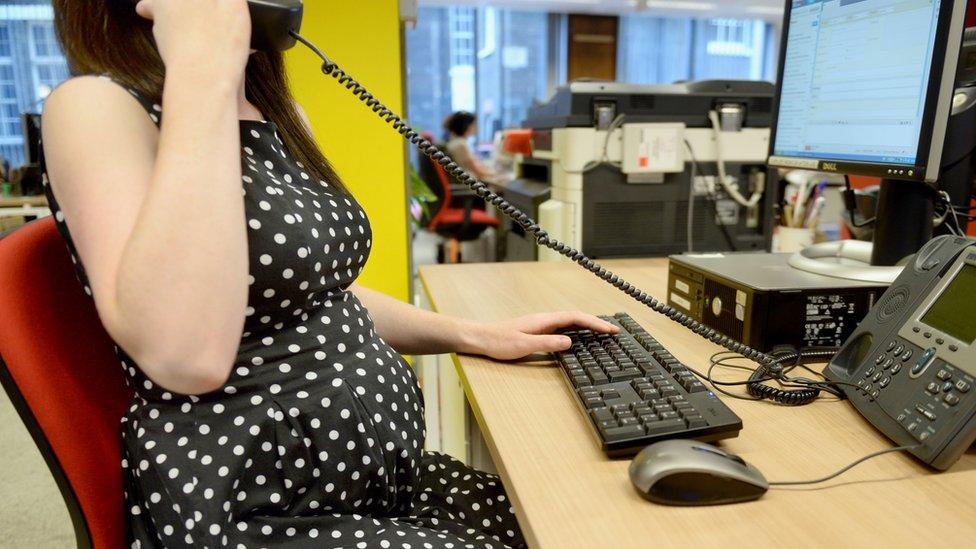Stronger rights considered for new and expectant mothers
- Published

Extra legal protection for new and expectant mothers who feel they are being forced out of their jobs is being considered by the government.
A consultation will be launched "in due course" on strengthening the existing law against such discrimination.
The move is in response to last August's recommendations from MPs on the Women and Equalities Committee, external.
However, the government will not give such women extra time to take their cases to an employment tribunal.
Business Minister Margot James said: "There should be zero tolerance of discrimination against pregnant women, or women who have just given birth.
"That's why today we are committing to making sure new and expectant mothers have sufficient protections from redundancy."
'No progress'
Women are reluctant to speak publicly about pregnancy and discrimination in the workplace for fear of being labelled "trouble-makers".
One woman, who declined to be named, was up for partnership at a law firm, but before the interview could take place, she left to have her baby. "When I came back from maternity leave, it was never mentioned again." She left her job.
"Rachel", who worked in public relations, said: "Before I fell pregnant, I had been asking about promotion opportunities, and possibilities were discussed with my manager.
"However, when I became pregnant, these discussions did not seem to progress, despite having the same level of experience and responsibility that other team members had when they received promotions.
"On my return from maternity leave, I raised the issue of promotion again, and was told that if I wanted any hope of promotion, flexible working would make it very difficult.
Amelia, a marketing expert in the media industry who was helped by the support group Maternity Action, said a pay rise she was promised was cut by 35% once she told her boss she was pregnant.
She became very ill with a pregnancy-related illness, but her company's refusal to pay for treatment and disagreements over pay meant she and her partner burnt through their savings before finally being evicted.
Amelia said that the support just wasn't there for pregnant women at work. "When I told them I was pregnant I felt it immediately, this attitude of 'what is the point in investing in you'."

What are your rights?

If you think you are being badly treated:
Gather evidence - keep a record of any conversations you have during your pregnancy and maternity leave with your employer, as it can be used as evidence, says Maternity Action. Email records are good, so confirm conversations by email where possible or make a running handwritten diary of events
Start with a conversation - many problems can be resolved with an informal conversation with your manager or HR department. Try to maintain a good relationship with your employer
Make it formal - if you don't get a satisfactory response after talking it through make a formal, written complaint. Every company should have a procedure to deal with this
Get advice - seek advice on whether you have a case and how best to present it. Contact your union if you have one, check if legal advice is covered by your home insurance, or call Maternity Action or Acas, a statutory body that provides free advice on employment law.
Take legal action - Acas can work as an impartial go-between to help you reach an agreement with your employer. Once you have tried this you can take the case to a tribunal - which can cost up to £1,200. You have to start proceedings with Acas within three months of the alleged discrimination.

'Clearly unacceptable'
It is against the law to discriminate against a woman because she is pregnant or has recently given birth.
This legal protection should last from when a woman becomes pregnant until the end of her maternity leave.
But last year, the Parliamentary committee heard evidence, which they described as "shocking", that discrimination was in fact common.
Mum Dawn described how she lost her job while she was on maternity leave
The number of expectant and new mothers forced to leave their jobs had almost doubled to 54,000 since 2005, they heard.
Research considered by the MPs also showed that 11% of mothers felt they had been forced out of their jobs, mostly by bad treatment by their employers rather than through direct dismissal or redundancy.
"This is clearly unacceptable," said the government.
No dilution
The committee of MPs made 18 recommendations to stop unfair treatment by employers, with the key change of giving women greater legal protection now gaining government support.
Backing has also been given to the idea that employers should be required to carry out individual health assessments on expectant or new mothers.

Extending the rights of permanent employees to temporary, agency or zero-hours staff will be considered by a separate review of employment practices led by Matthew Taylor, of the Royal Society of Arts.
The government has also re-stated its commitment that leaving the European Union will not lead to a dilution of workers' rights in the UK.
But a call by the MPs, to extend from three months to six the time limit for discrimination cases to be taken to employment tribunals, has been turned down.
The government said there was no strong evidence that the current limit was a deterrent to making a claim on maternity or pregnancy grounds.
However, the government said it would consider reminding tribunals that they already have the power to be flexible and to extend the time limits, case by case, if they see fit.
- Published31 August 2016

- Published31 August 2016
